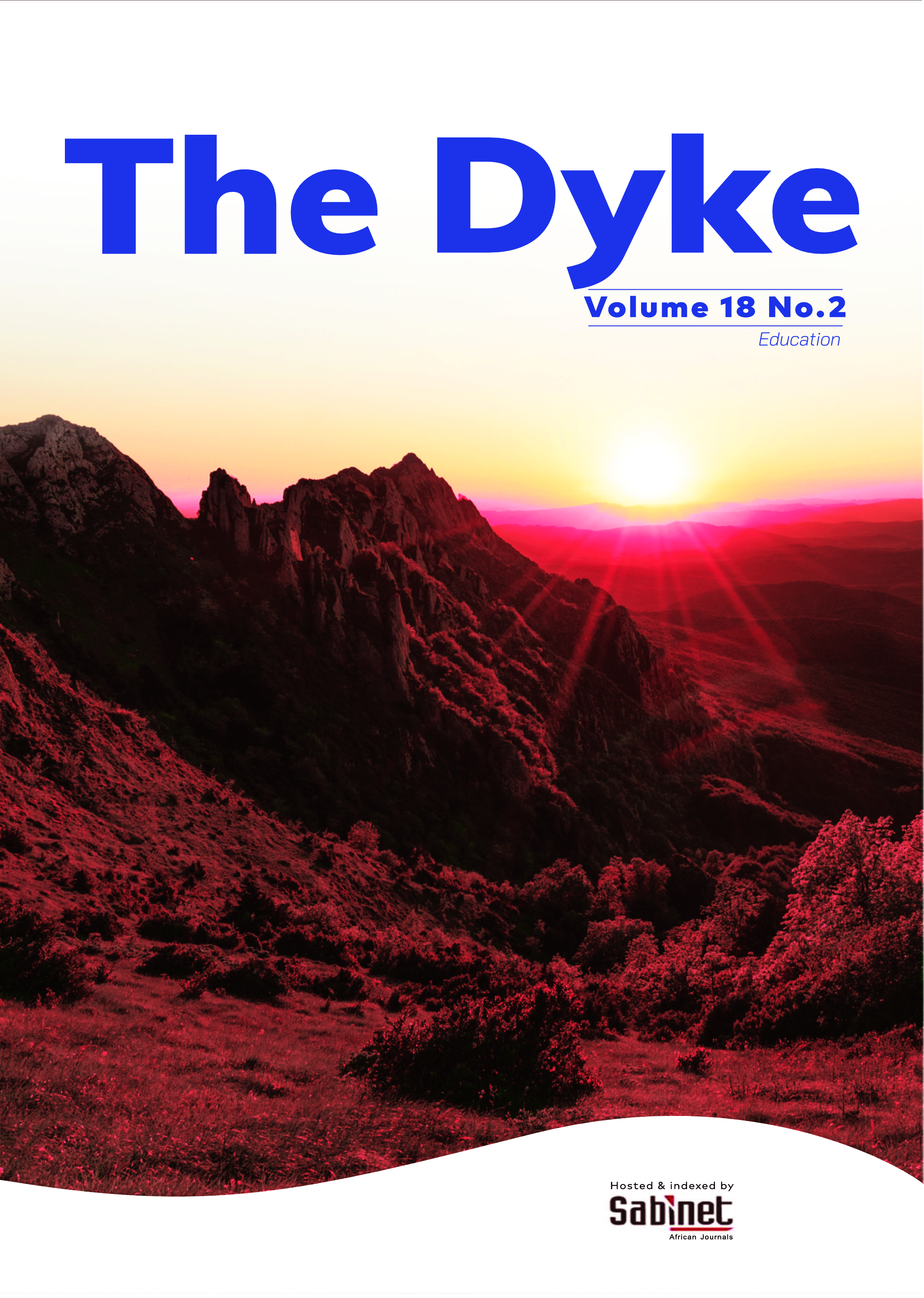Decolonising the teaching of weather and climate-related disasters through secondary school Geography: Lessons from Zimbabwe
DOI:
https://doi.org/10.64754/thedyke.v18i2.523Keywords:
hazards, decolonisation, disasters, Indigenous Knowledge Systems, Outcome Mapping, climate changeAbstract
This paper explores how education on weather and climate-related disasters can be made more relevant to indigenous communities in Zimbabwe by moving beyond the prevailing Western pedagogical framework. This reorientation is critical, as the majority of hazards and resultant disasters affecting Zimbabwe are climate-related. Consequently, effective disaster prediction, adaptation, and mitigation are essential components of education. The study addresses four key research questions: (1) What is the role of Indigenous Knowledge Systems (IKS) within scientific discourse? (2) How is indigenous knowledge incorporated into official geography syllabuses? (3) To what extent is indigenous knowledge applicable to the explanation of geographical phenomena, particularly those linked to weather and climate disasters? (4) How can indigenous knowledge be meaningfully integrated into the Zimbabwean geography curriculum? The paper recommends the infusion of IKS into the curriculum and advocates for the dissemination of such knowledge from schools to communities through the Outcome Mapping (OM) strategy. This approach aligns with Zimbabwe’s broader objective of establishing a relevant, heritage-based education system.
References
Abarquez, I. & Murshed, Z. (2004). Community-based Disaster Risk Management: Field practitioners’ handbook. Asian Disaster Preparedness Centre (ADPC), Klong Luang.
Battiste, M. (2019). Decolonizing education: Nourishing the learning spirit. University of British Columbia Press.
Benson, C., Twigg, J. & Myers, M. (2001). NGO initiatives in risk reduction: An overview. Disasters, 25(3), 199-215. https://doi.org/10.1111/1467-7717.00172.
Blaikie, P., Cannon, T., Davis, I. & Wisner, B. (1994). At Risk: Natural hazards, people’s vulnerability and disasters. New York: Routledge.
Chimbunde, P., & Kgari-Masondo, M. C. (2021). Decolonising curriculum change and implementation: Voices from social studies Zimbabwean teachers. Yesterday and today, (25), 1-22.
Earl, S., Carden, F., & Smutylo, T. (2001). Outcome Mapping: Building Learning and Reflection into Development Programs. International Development Research Centre (IDRC). www.idrc.ca
Haimes, Y. Y. (2009). On the definition of resilience in systems. Risk Analysis, 29(4), 498–501. https://doi.org/10.1111/j.1539-6924.2009.01216.x
International Federation of Red Cross and Red Crescent Societies IFRC. (2016) World Disasters Report: Resilience: saving lives today, investing for tomorrow. Geneva
Khoza, R. J., (2018). Concepts of Ubuntu and attuned leadership. London: Penguin
Lunga, W., Bongo, P.P., Van Niekerk, D. & Musarurwa, C., 2019, ‘Disability and disaster risk reduction as an incongruent matrix: Lessons from rural Zimbabwe’, Jàmbá: Journal of Disaster Risk Studies 11(1), a648. https://doi.org/10.4102/jamba.v11i1.648
Mapira, J., & Mazambara, P. (2013). Indigenous knowledge systems and their implications for sustainable development in Zimbabwe. Journal of Sustainable Development in Africa, 15(5) p90-106341
McGregor, R & Park, M.S. (2019). Towards a deconstructed curriculum: Rethinking higher education in the global north. Journal of Teaching in Higher Education, 24(3), 332-345.
Roos, V., Chigeza, S. & Van Niekerk, D. (2010). Coping with drought: Indigenous knowledge application in rural South Africa. Indilinga: African Journal of Indigenous Knowledge Systems, 9(1), 1–11.
Simpson, L. B. (2017). As we have always done: Indigenous freedom through radical resistance. University of Minnesota Press.
Sundberg, J. (2014). Decolonizing post humanist geographies. Cultural Geographies, 21(1), 33-47.
UNICEF Zimbabwe (2023) Disaster Risk Management And Resilience In Schools Manual: A Step-by-Step Guide to ensure all schools are safe and resilient in Zimbabwe, UK Aid Unicef.
Wisner, B., Blaikie, P., Cannon, T. & Davis, I. (2014a). At Risk: Natural hazards, people’s vulnerability and disasters. London: Routledge.
Wisner, B., Oxley, M., Budihardjo, P.H., Copen, K., Castillo, G., Cannon, T., et al. (2014b). Down home, it’s all the same. In L. Schipper, J. Ayers, H. Reid, S. Huq & A. Rahman (eds.), Community-based Adaptation to Climate Change: Scaling it up (pp. 172–191). London: Earthscan.

Downloads
Published
How to Cite
Issue
Section
License
Copyright (c) 2025 Upon acceptance and publication, authors grant The Dyke a non-exclusive licence to publish and distribute their article in all formats and media. This means: Authors may freely share, deposit, and republish their work (e.g., in institutional repositories, websites, or future publications), provided proper citation and acknowledgment of The Dyke as the original publisher.

This work is licensed under a Creative Commons Attribution 4.0 International License.
All articles in The Dyke are published under the Creative Commons Attribution 4.0 International License (CC BY 4.0).
Under this licence:
- Others may copy, redistribute, remix, transform, and build upon the work for any purpose, even commercially.
- Appropriate credit must be given to the original author(s) and source (The Dyke), along with a link to the license.
- Any changes made must be indicated.
Full licence details: https://creativecommons.org/licenses/by/4.0/
Archiving and Preservation
The Dyke supports long-term preservation of scholarly work through partnerships with digital repositories and indexing services, including Sabinet African Journals. Authors are also encouraged to deposit a copy of their published article in institutional or subject-specific repositories.




